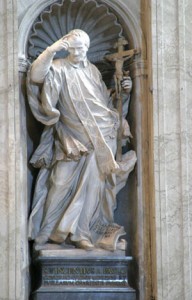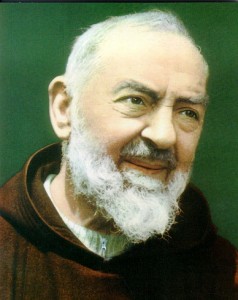The Novena to St. Teresa of Avila, Day 6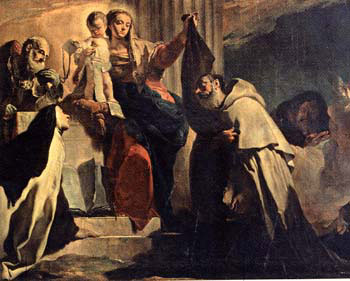
composed by  by St. Alphonsus of Liguori.
Join in on Day 6 [powerpress = “devotionals-prayers”]
O most bountiful Lord Jesus Christ! we thank Thee for the gift of devotion towards Thy sweet mother, Mary and her holy spouse, Joseph, which Thou didst grant to Thy beloved Teresa; we pray Thee, by Thy merits, and by those of Thy most dear spouse, to give us the grace of a special and tender devotion towards Thy most holy mother, Mary, and towards Thy beloved foster-father, Joseph.
Say one Our Father, Hail Mary and Glory be.
V. St. Teresa, pray for us:
R. That we may become worthy of the promises of Jesus Christ.
Let us pray: Graciously hear us, O God of our salvation! that as we rejoice in the commemoration of the blessed virgin Teresa, so we may be nourished by her heavenly doctrine, and draw from thence the fervour of a tender devotion; through our Lord Jesus Christ, Thy Son, Who liveth and reigneth with Thee in the unity of the Holy Spirit, God for ever and ever. Amen
Tags: catholic, catholic podcast, catholic prayer, cathollc spirituality, hail mary, jesus christ, Lord Jesus Christ, st teresa
This entry was posted on Wednesday, October 12th, 2011 at 12:04 am
You can follow any responses to this entry through the RSS 2.0 feed.
Vatican City, Oct 6, 2010 / 03:54 pm (CNA/EWTN News).- Anticipating Thursday’s celebration of the Feast of Our Lady of the Rosary, the Holy Father called on the faithful to make an effort to rediscover the prayer. He urged Christians to seek intercession, protection and personal encounter with Christ through the “simple but efficient prayer,” especially during the Marian month of October.
Greeting the faithful in 10 different languages during Wednesday’s general audience, the Holy Father spoke of the Rosary as “a particular prayer of the Church and a spiritual weapon for each of us.”
He prayed that the meditation of Jesus and Mary’s life through the Rosary might be, “for all of us, light on the evangelical path of spiritual renewal and conversion of heart.”
Speaking in Portuguese, but referring to all people, he invited families to join together with the Virgin Mary so as to cooperate fully with the salvific designs of God. In Croatian, he said to ask for her intercession and protection for each person and family, exhorting prayers also for vocations to the priesthood and religious life.
In still other languages, 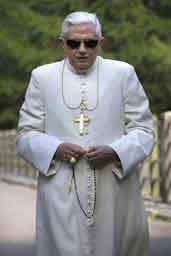 he asked that the faithful “rediscover the value” of the “simple but efficient prayer” of the Rosary “as a way for a personal encounter with Christ.”
he asked that the faithful “rediscover the value” of the “simple but efficient prayer” of the Rosary “as a way for a personal encounter with Christ.”
“October,” he said in the Italian greeting that concluded his public words on Wednesday, “is the month of the Holy Rosary, which invites us to value this prayer so dear to the tradition of the Christian people.”
Addressing some of the special guests at the audience, he said, “I invite you, dear young people, to make of the Rosary your daily prayer. I encourage you, dear sick, to grow, thanks to the recitation of the Rosary, in the trusting abandonment to the hands of God. I exhort you, dear newlyweds, to make of the Rosary a constant contemplation of the mysteries of Christ.” – CNA
Tags: catholic, catholic podcast, catholic prayer, cathollc spirituality, feast of our lady of the rosary, holy father, intercession, month of the holy rosary, prayer, prayer of the rosary, virgin mary
This entry was posted on Sunday, October 9th, 2011 at 8:29 pm
You can follow any responses to this entry through the RSS 2.0 feed.
St. Thais is one of the conversion stories just begging for an opera…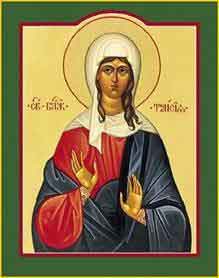 and thanks to Jules Massenet we have one. I couldn’t find any renderings of St. Thais that weren’t (for me) uncomfortably provocative, except for the icon pictured. When you read her life story you know why.
and thanks to Jules Massenet we have one. I couldn’t find any renderings of St. Thais that weren’t (for me) uncomfortably provocative, except for the icon pictured. When you read her life story you know why.
St. Thais lived in Egypt in the fifth century. Left an orphan after the death of her wealthy parents, she led a pious life, distributing her wealth to the poor and giving shelter to pilgrims on her estate. She decided that she would never marry, but would devote her life to serving Christ.
After spending all her inheritance, Thais was tempted to acquire more money by any means and began to lead a sinful life. The Elders of Sketis near Alexandria heard of her fall, and asked St. John the Dwarf to go to Thais and persuade her to repent. “She was kind to us,†they said, “now perhaps we can help her. You, Father, are wise. Go and try to save her soul, and we will pray that the Lord will help you.â€
The Elder went to her home, but Thais’s servant refused to let him into the house. St. John said, “Tell your mistress that I have brought her something very precious.†Knowing that the monks sometimes found pearls at the seashore, Thais told her servant to admit the visitor. St. John sat down and looked her in the face, and then began to weep. Thais asked him why he was crying. “How can I not weep,†he asked, “when you have forsaken your Bridegroom, the Lord Jesus Christ, and are pleasing Satan by your deeds?â€
The Elder’s words pierced the soul of Thais like a fiery arrow, and at once she realized how sinful her present life had become. In fear, she asked him if God would accept the repentance of a sinner like her. St. John replied that the Savior awaited her repentance, and that was why He came, to seek and to save the perishing. “He will welcome you with love,†he said, “and the angels will rejoice over you. As the Savior said Himself, one repentant sinner causes the powers of Heaven to rejoice.†(Luke 15:7).
A feeling of repentance enveloped her, and regarding the Elder’s words as a call from the Lord Himself to return to Him, Thais trembled and thought only of finding the path of salvation. She stood up and left her house without speaking to her servants, and without making any plans for the disposal of her property, so that even St. John was amazed.
Following St. John into the wilderness, she returned to God through penitence and prayer. Night fell, and the Elder prepared a place for Thais to lay down and sleep. He made a pillow for her from the sand, and he went off somewhat farther, going to sleep after his evening prayers.
In the middle of the night, he was awakened by a light coming down from the heavens to the place where Thais was sleeping. In the radiant light, he saw holy angels bearing her soul to Paradise. When he went over to Thais, he found her dead.
St. John prayed and asked God to reveal to him whether Thais had been saved. An angel of God appeared and told him, “Abba John, her one hour of repentance was equal to many years, because she repented with all her soul, and a compunctionate heart.â€
After burying the body of the saint, St. John returned to Sketis and told the monks what had happened. All offered thanks to God for His mercy toward Thais who, like the wise thief, repented in a single moment. – antiochan.org
OK, now in the opera, the monk falls in love with Thais after her conversion, but after her time in the desert, she rebukes him, embrasses heaven…then dies (it’s an opera after all…somebody always dies in the end). “Thais” by Massenet is one of my favorite performances by my FAVORITE soporano, Renee Fleming…I LOVE THIS ENDING (we should all look so could when we pass on). You just have to love those French composers (you’ll probably recognize the melody 5 minutes in) What a way to be commerated…St. Thais, please pray for us
Tags: catholic, catholic podcast, catholic prayer, cathollc spirituality, monks, pious life, repentance, repentant sinner, St. John, Thais
This entry was posted on Saturday, October 8th, 2011 at 8:28 pm
You can follow any responses to this entry through the RSS 2.0 feed.
St. Bruno was one of the most exceptional scholars, teachers, prayer warriors of his time : “…a prudent man whose word was rich in meaning.” I think the key was the gift of great humility. He must have been very close to Our Lady.
: “…a prudent man whose word was rich in meaning.” I think the key was the gift of great humility. He must have been very close to Our Lady.
The Order founded by Bruno — the Carthusians — is one of the strictest in the Church. Carthusians follow the Rule of St. Benedict, but accord it a most austere interpretation; there is perpetual silence and complete abstinence from flesh meat (only bread, legumes, and water are taken for nourishment). Bruno sought to revive the ancient eremitical (hermit)Â way of life. His Order enjoys the distinction of never becoming unfaithful to the spirit of its founder, never needing a reform.
Quote:
Rejoice, my dearest brothers, because you are blessed and because of the bountiful hand of God’s grace upon you. Rejoice, because you have escaped the various dangers and shipwrecks of the stormy world. Rejoice because you have reached the quiet and safe anchorage of a secret harbor. Many wish to come into this port, and many make great efforts to do so, yet do not achieve it. Indeed many, after reaching it, have been thrust out, since it was not granted them from above. By your work you show what you love and what you know. When you observe true obedience with prudence and enthusiasm, it is clear that you wisely pick the most delightful and nourishing fruit of divine Scripture.
~from a letter by Saint Bruno to the Carthusians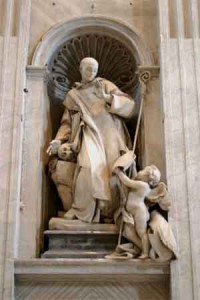
Collect:
Father,
you called St. Bruno to serve you in solitude.
In answer to his prayers
help us to remain faithful to you.
amid the changes of this world.
We ask this through our Lord Jesus Christ, your Son,
who lives and reigns with you and the Holy Spirit,
one God, forever and ever. Amen.
St. Bruno is the patron of diabolic possession. St. Bruno, confessor, ecclesiastical writer, and founder of the Carthusian Order. He was born at Cologne about the year 1030; died October 6, 1101.
Tags: Carthusians, catholic, catholic podcast, catholic prayer, cathollc spirituality, humility, prayer, silence, st bruno
This entry was posted on Thursday, October 6th, 2011 at 8:37 am
You can follow any responses to this entry through the RSS 2.0 feed.
I LOVE talking with Fr. James Martin, especially about the saints!  “Between Heaven and Mirth: Why Joy,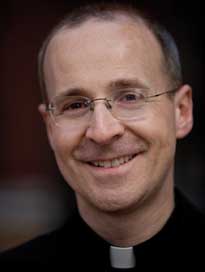 Humor, and Laughter Are at the Heart of the Spiritual Life” is fantastic! I don’t think there’s another book like it out there. Fr. Martin takes Scripture, history, the Saints, and the basics of our faith and the spiritual life, and wraps them  all together to bring us a unique and wonderful study of joy and happiness. To say it was uplifting to read would be an understatement.  Others have tried to write humorous books about the Christian faith, but often times their attempts come  off little crass and a tad tasteless….but not Fr. Jim Martin, that’s because it about joy, happiness and grace…and he leads to the well where we can find it.  [powerpress]
Humor, and Laughter Are at the Heart of the Spiritual Life” is fantastic! I don’t think there’s another book like it out there. Fr. Martin takes Scripture, history, the Saints, and the basics of our faith and the spiritual life, and wraps them  all together to bring us a unique and wonderful study of joy and happiness. To say it was uplifting to read would be an understatement.  Others have tried to write humorous books about the Christian faith, but often times their attempts come  off little crass and a tad tasteless….but not Fr. Jim Martin, that’s because it about joy, happiness and grace…and he leads to the well where we can find it.  [powerpress]
You can find the book here
Tags: catholic, catholic podcast, catholic prayer, cathollc spirituality, fr. james martin, humor, James Martin, Jim Martin, Mirth, saints
This entry was posted on Wednesday, October 5th, 2011 at 10:19 am
You can follow any responses to this entry through the RSS 2.0 feed.
 Saint Maria Faustina Kowalska –The Humble Instrument
Saint Maria Faustina Kowalska –The Humble Instrument
The article below is found on the Divine Mercy website – I highly encourage you to visit there (they are doing wonderful things)!
Sister Faustina was a young, uneducated, nun in a convent of the Congregation of Sisters of Our Lady of Mercy in Cracow, Poland during the 1930’s. She came from a very poor family that struggled on their little farm during the years of World War I. She had only three years of very simple education, so hers were the humblest tasks in the convent, usually in the kitchen or garden. However, she received extraordinary revelations or messages from Our Lord Jesus. Jesus asked Sr. Faustina to record these experiences, which she compiled in notebooks. These notebooks are known today as the Diary of Saint Maria Faustina Kowalska and the words contained within are God’s loving message of Divine Mercy. Though the Divine Mercy message is not new to the teachings of the Church, Sr. Faustina’s Diary sparked a great movement, and a strong and significant focus on the mercy of Christ. Pope John Paul II canonized Sr. Faustina in 2000 making her the “first saint of the new millennium.” Speaking of Sr. Faustina and the importance of the message contained in her Diary, the Pope call her “the great apostle of Divine Mercy in our time.” Today, we continue to rely of Saint Faustina as a constant reminder of the message to trust in Jesus’ endless mercy, and to live life mercifully toward others. We also turn to her in prayer and request her intercession to our merciful Savior on our behalf. At the National Shrine of The Divine Mercy, we include the following in our 3 o’clock prayers:
Saint Faustina,
You told us that your mission would continue after your death and that you would not forget us. Our Lord also granted you a great privilege, telling you to “distribute graces as you will, to who you will, and when you will.” Relying on this, we ask your intercession for the graces we need, especially for the intentions just mentioned. Help us, above all, to trust in Jesus as you did and thus to glorify His mercy every moment of our lives. Amen
–from DivineMercy.org
Here is my favorite (if that is possible) of the notebook V “Conversation” dialogues
The Diary of
St. Â M. Faustina Kowalska
Perpetually Professed member
of the
Congregation of Sisters of
Our Lady of Mercy
NOTEBOOK V
Conversation of the Merciful God with a Soul Striving after Perfection.
Jesus: I am pleased with your efforts, O soul aspiring for perfection, but why do I see you so often sad and depressed? Tell Me, My child, what is the meaning of this sadness, and what is its cause?
Soul: Lord, the reason for my sadness is that, in spite of my sincere resolutions, I fall again into the same faults. I make resolutions in the morning, but in the evening I see how much I have departed from them.
Jesus: You see what you are of yourself. The cause of your falls is that you rely too much upon yourself and too little on Me. But let this not sadden you so much. You are dealing with the God of mercy, which your misery cannot exhaust. Remember, I did not allot only a certain number of pardons.
Soul: Yes, I know all that but the great temptations assail me, and various doubts waken within me and moreover, everything irritates and discourages me.
Jesus: My child, know that the greatest obstacles to holiness are discouragement and an exaggerated anxiety. These will deprive you of the ability to practice virtue. All temptations united together ought not disturb your interior peace, not even momentarily. Sensitiveness and discouragement are fruits of self love. You should not become discouraged, but strive to make My love reign in place of your self love. Have confidence, My child. Do not lose heart in coming for pardon, for I am always ready to forgive you. As often as you beg for it, you glorify My mercy.
Soul: I understand what is the better thing to do, what pleases You more, but I encounter great obstacles in acting on this understanding.
Jesus: My child, life on earth is a struggle indeed; a great struggle for My kingdom. But fear not, because you are not alone. I am always supporting you, so lean on Me as you struggle, fearing nothing. Take the vessel of trust and draw from the fountain of life – for yourself, but also for other souls, especially such as are distrustful of My goodness.
Soul: O Lord, I feel my heart being filled with Your love and the rays of Your mercy and love piercing my soul. I go, Lord, at Your command. I go to conquer souls. Sustained by Your grace, I am ready to follow You Lord, not only to Tabor, but also to Calvary. I desire to lead souls to the fount of Your mercy so that the splendor of Your mercy may be reflected in all souls, and the home of our Father be filled to overflowing. And when the enemy begins to attack me, I shall take refuge behind the shield of Your mercy.
Pray the Divine Mercy Prayer [powerpress = “devotionals-prayers”]
The Discerning Hearts Divine Mercy Novena Page
Tags: catholic, catholic podcast, catholic prayer, cathollc spirituality, divine mercy, divine mercy message, Faustina Kowalska, john paul ii, mystic, mystic of the Church, national shrine of the divine mercy, Saint Faustina, saint maria faustina kowalska, Sister Faustina, st faustina
This entry was posted on Wednesday, October 5th, 2011 at 12:04 am
You can follow any responses to this entry through the RSS 2.0 feed.

My Guardian Dear,
to whom His love commits me here,
ever this day be at my side,
to light and to guard,
to rule and guide.
Amen.
For they are ministering spirits, sent for service, for the sake of those who will inherit salvation†(Heb 1:14)
 O holy Guardian Angel, my dear friend and solicitous guide on the dangerous way of life, to thee be heartfelt thanks for the numberless benefits which have been granted me through thy love and goodness and for the powerful help by which thou hast preserved me from so many dangers and temptations. I beg of thee, let me further experience thy love and thy care. Avert from me all danger, increase in me horror for sin and love for all that is good. Be a counselor and consoler to me in all the affairs of my life, and when my life draws to a close, conduct my soul through the valley of death into the kingdom of eternal peace, so that in eternity we may together praise God and rejoice in His glory. Through Jesus Christ Our Lord.
O holy Guardian Angel, my dear friend and solicitous guide on the dangerous way of life, to thee be heartfelt thanks for the numberless benefits which have been granted me through thy love and goodness and for the powerful help by which thou hast preserved me from so many dangers and temptations. I beg of thee, let me further experience thy love and thy care. Avert from me all danger, increase in me horror for sin and love for all that is good. Be a counselor and consoler to me in all the affairs of my life, and when my life draws to a close, conduct my soul through the valley of death into the kingdom of eternal peace, so that in eternity we may together praise God and rejoice in His glory. Through Jesus Christ Our Lord.
Amen.
O Angel of God, make me worthy of thy tender love, thy celestial companionship and thy never-failing protection!
For He will give His angels charge of you to guard you in all your ways.
On their hands they will bear you up, lest you dash your foot against a stone. (Ps 91)
The Holy Angels, and in particular our Guardian Angels, are such a wonderful gift to us from the Father! Let us give thanks to Him for his generosity and to our Guardian Angel for their presence in our lives!
It’s really important to understand the difference in the angels beyond all the New Age silliness. There are the Holy Angels (we love them and they love us) and the fallen angels (bad, bad, bad)…it’s what discernment and spiritual warfare, on many levels, are all about.
Bruce and I, thanks to Fr. Damien Cook, had the opportunity to speak to Fr. Titus Kieninger of Opus Sanctorum Angelorum about the role of Holy Angels. Be prepared…you’ll have to listen a couple of times to this discussion;  Fr. Titus Kieninger gives so much information about their mission that you’ll need hear a few times to get it all.
[powerpress]
Be sure to visit Opus Sanctorum Angelorum
Let us affectionately love His angels as counselors and defenders appointed by the Father and placed over us. They are faithful; they are prudent; they are powerful; Let us only follow them, let us remain close to them, and in the protection of the God of heaven let us abide. ~ St. Bernard of Clairvaux
Tags: Angel of God, catholic, catholic podcast, catholic prayer, cathollc spirituality, feast of the guardian angels, Fr. Titus Kieninger, Guardian Angel, holy angels, holy guardian angel, Opus Sanctorum Angelorum, ORC
This entry was posted on Sunday, October 2nd, 2011 at 12:33 am
You can follow any responses to this entry through the RSS 2.0 feed.
 “For me, prayer is a surge of the heart; it is a simple look turned toward heaven, it is a cry of recognition and of love, embracing both trial and joy.” – St. Therese of of Lisieux
“For me, prayer is a surge of the heart; it is a simple look turned toward heaven, it is a cry of recognition and of love, embracing both trial and joy.” – St. Therese of of Lisieux
Sometimes words are not full enough to describe someone.
Therese  is a melody.
A melody of grace lofting lyrically around our hearts in prayer;
a sound which invokes joy and sorrow, smiles and tears,
trust, hope and…love.
I’m not a musician, but I know a beautiful song when I hear it.
Her melody is one you wish never would end,
with Therese, “you hear the song”.
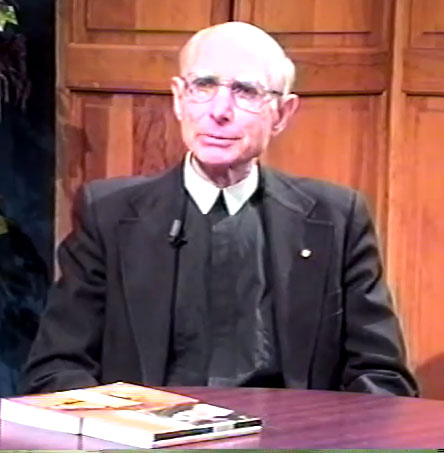 [powerpress]Bruce and I had a chance to speak with Brother Joseph Schmidt about St. Therese. He wrote about her in “Everything is Grace”.
[powerpress]Bruce and I had a chance to speak with Brother Joseph Schmidt about St. Therese. He wrote about her in “Everything is Grace”.
This is my VERY favorite book about St. Therese…it’s wonderful
MY ONLY OCCUPATION IS LOVE
“I do not desire either suffering or death, although both are appealing to me;
it is love alone which really attracts me…
I can ask for nothing with any enthusiasm
except the perfect accomplishment of the Divine Will in my soul,
unhindered by any intrusion of created things.
I can say, with the words of our father, St. John of the Cross,
in his Spiritual Canticle,
‘I drank in the inner cellar of my Beloved, and when I went forth into the meadow
I forgot everything and lost the flock which I used to drive.
My soul has employed all its resources in His service;
now I guard no flock, nor do I have any other duties.
Now my only occupation is love.’
Or again: ‘I know love is so powerful that it can turn
whatever is good or bad in me into profit,
and it can transform my soul into Himself.”
~ St. Thérèse
A MORNING PRAYER WRITTEN BY ST. THERESE
O my God! I offer Thee all my actions of this day for the intentions and for the glory of the Sacred Heart of Jesus. I desire to sanctify every beat of my heart, my every thought, my simplest works, by uniting them to Its infinite merits; and I wish to make reparation for my sins by casting them into the furnace of Its Merciful Love.
O my God! I ask of Thee for myself and for those whom I hold dear, the grace to fulfill perfectly Thy Holy Will, to accept for love of Thee the joys and sorrows of this passing life, so that we may one day be united together in heaven for all Eternity.
Amen.
PRAYER TO ST. THERESE
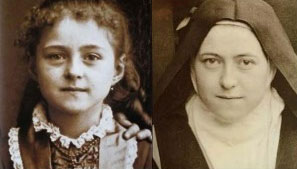 O little St. Theresa of the Child Jesus, who during your short life on earth became a mirror of angelic purity, of love strong as death, and of wholehearted abandonment to God, now that you rejoice in the reward of your virtues, cast a glance of pity on me as I leave all things in your hands. Make my troubles your own – speak a word for me to our Lady Immaculate, whose flower of special love you were – to that Queen of heaven “who smiled on you at the dawn of life.” Beg her as the Queen of the heart of Jesus to obtain for me by her powerful intercession, the grace I yearn for so ardently at this moment, and that she join with it a blessing that may strengthen me during life. Defend me at the hour of death, and lead me straight on to a happy eternity.
O little St. Theresa of the Child Jesus, who during your short life on earth became a mirror of angelic purity, of love strong as death, and of wholehearted abandonment to God, now that you rejoice in the reward of your virtues, cast a glance of pity on me as I leave all things in your hands. Make my troubles your own – speak a word for me to our Lady Immaculate, whose flower of special love you were – to that Queen of heaven “who smiled on you at the dawn of life.” Beg her as the Queen of the heart of Jesus to obtain for me by her powerful intercession, the grace I yearn for so ardently at this moment, and that she join with it a blessing that may strengthen me during life. Defend me at the hour of death, and lead me straight on to a happy eternity.
Amen
Tags: catholic, catholic podcast, catholic prayer, cathollc spirituality, heart, joseph schmidt, joy, love, St. therese little flower, st. therese of lieseux, THERESE
This entry was posted on Saturday, October 1st, 2011 at 12:02 am
You can follow any responses to this entry through the RSS 2.0 feed.
VATICAN CITY, 6 APR 2011 (VIS) – In his general audience in St. Peter’s Square today, attended by more than 10,000 people, Benedict XVI dedicated his catechesis to St. Therese of Lisieux, or St. Therese of the Child Jesus and the Holy Face, “who lived in this world for only twenty-four years at the end of the nineteenth century, leading a very simple and hidden life, but who, after her death and the publication of her writings, became one of the best-known and loved saints”.
“Little Therese“, the Pope continued, “never failed to help the most simple souls, the little ones, the poor and the suffering who prayed to her, but also illuminated all the Church with her profound spiritual doctrine, to the point that the Venerable John Paul II, in 1997, granted her the title of Doctor of the Church … and described her as an ‘expert in scientia amoris’. Therese expressed this science, in which all the truth of the faith is revealed in love, in her autobiography ‘The Story of a Soul’, published a year after her death”.
Therese was born in 1873 in Alencon, France. She was the youngest of the nine children of Louis and Zelie Martin, and was beatified in 2008. Her mother died when she was four years old, and Therese later suffered from a serious nervous disorder from which she recovered in 1886 thanks to what she later described as “the smile of the Virgin”. In 1887 she made a pilgrimage to Rome with her father and sister, where she asked Leo XIII for permission to enter Carmel of Lisieux, at just fifteen years of age. Her wish was granted a year later; however, at the same time her father began to suffer from a serious mental illness, which led Therese to the contemplation of the Holy Face of Christ in his Passion. In 1890 she took her vows. 1896 marked the beginning of a period of great  physical and spiritual suffering, which accompanied her until her death.
physical and spiritual suffering, which accompanied her until her death.
In those moments, “she lived the faith at its most heroic, as the light in the shadows that invade the soul” the Pope said. In this context of suffering, living the greatest love in the littlest things of daily life, the Saint realised her vocation of becoming the love at the heart of the Church”.
She died in the afternoon of 30 September, 1897, uttering the simple words, “My Lord, I love You!”. “These last words are the key to all her doctrine, to her interpretation of the Gospel”, the Pope emphasised. “The act of love, expressed in her final breath, was like the continued breathing of the soul … The words ‘Jesus, I love You’ are at the centre of all her writings”.
St. Therese is “one of the ‘little ones’ of the Gospel who allow themselves to be guided by God, in the depth of His mystery. A guide for all, especially for… theologians. With humility and faith, Therese continually entered the heart of the Scriptures which contain the Mystery of Christ. This reading of the Bible, enriched by the science of love, does not oppose academic science. The ‘science of the saints’, to which she refers on the final page of ‘The Story of a Soul’, is the highest form of science”.
“In the Gospel, Therese discovers above all the Mercy of Jesus … and ‘Trust and Love’ are therefore the end point of her account of her life, two words that, like beacons, illuminated her saintly path, in order to guide others along the same ‘little way of trust and love’, of spiritual childhood. Her trust is like that of a child, entrusting herself to the hands of God, and inseparable from her strong, radical commitment to the true love that is the full giving of oneself”, the Holy Father concluded.
More on St. Therese can be found here
Also click here for a Novena to St. Therese
Tags: catholic, catholic podcast, catholic prayer, cathollc spirituality, doctor of the church, little way, pope benedict xvi, st therese of lisieux, st therese of the child jesus, story of a soul, therese of the child jesus
This entry was posted on Saturday, October 1st, 2011 at 12:01 am
You can follow any responses to this entry through the RSS 2.0 feed.
A Prayer to St. Lorenzo Ruiz
Beloved Lorenzo Ruiz, confronted with death, you proclaimed your readiness to die a thousand times for your Christian faith. Today the whole world admires your courage. We feel particularly proud of you as our brother. And we pray: You, a family man, protect our families. Keep them united in love. You, who bore your sufferings with patience and resignation, intercede for the sick of mind and body; help them to receive the grace of God’s miraculous healing. You, who died in a foreign country, take care of Filipinos living and working in this country and in other parts of the world. You, an example of Christian fortitude, sustain our faith and make it spread and grow strong all around us. You, the Philippines’ first saint, be the country’s special protector. Unite us as one people; help us to work in harmony for development and progress; and give us peace. Amen.(State your intentions). San Lorenzo Ruiz, pray for us.  Amen.
Tags: catholic, catholic podcast, catholic prayer, cathollc spirituality, Christian faith, filipino saint, martyrdom, Martyrdom of St. Lorenzo Ruiz, philippines, san lorenzo ruiz, st lorenzo ruiz, St. Lorenzo Ruiz Beloved Lorenzo Ruiz
This entry was posted on Wednesday, September 28th, 2011 at 12:58 am
You can follow any responses to this entry through the RSS 2.0 feed.
 The French priest St. Vincent de Paul (1581-1660) organized works of charity, founded hospitals, and started two Roman Catholic religious orders.
The French priest St. Vincent de Paul (1581-1660) organized works of charity, founded hospitals, and started two Roman Catholic religious orders.
Vincent de Paul was born into a peasant family on April 24, 1581, in the village of Pouy in southwestern France. He became a priest at the age of 19, and would go on to found hospitals, charitable organizations and many other ministries and works that would serve the needs of the poor. With Louise de Marillac, a talented and sensitive friend, he started the first religious group of women dedicated entirely to works of charity outside the cloister, a group called the Daughters of Charity.
Vincent was a man of action rather than of theory. The religious spirit he communicated was simple, practical and straightforward. He looked to Christ as his leader and tried to translate the Gospel message into concrete results. He died on Sept. 27, 1660, and was canonized a saint in the Roman Catholic Church in 1737.
Words of Wisdom
from St. Vincent de Paul
“No matter what others say or do, even if the wicked succeed, do not be troubled: commit everything to God and put your trust in him.â€
“The most powerful weapon to conquer the devil is humility. For, as he does not know at all how to employ it, neither does he know how to defend himself from it.”
“But do you know what it is to labor in charity? It is to labor in God, for God is charity, and it is to labor for God purely and entirely; it is to do so in the grace of God.”
A “Great Hero of Charity”
As reported by Zenit, the Holy Father spoke of St. Vincent de Paul:
The Pope reflected on the Gospel reading from today’s Mass, which recounts the story of the rich man suffering torment, and the poor man Lazarus in the bosom of Abraham.The message of the parable, the Holy Father said, “points out that while we are in this world we must listen to the Lord who speaks to us through the Scriptures and live according to his will, because, after death, it will be too late to make amends.”
“So,” he explained, “this parable tells us two things: The first is that [God] loves the poor and lifts them up from their humiliation; the second is that our eternal destiny is
 conditioned by our attitude; it is up to us to follow the road to life that God has shown us, and this is the road of love, not understood as sentiment but as service to others in the charity of Christ.”
The Bishop of Rome called it a “happy coincidence” that Monday marks the feast of one of the Church’s great heroes of charity, St. Vincent de Paul, patron of Catholic charitable organizations.
“In the France of the 1600s, he touched with his own hand the great contrast between the richest and the poorest,” the Pope said. “[…] Driven by the love of Christ, Vincent de Paul knew how to organize stable forms of service to marginalized persons.”
In fact, the saint founded the first women’s congregation to live their consecration “‘in the world,’ in the midst of the people, with the sick and the needy,” he noted.
The Pontiff added, “Dear friends, only Love with a capital ‘L’ makes for true happiness!” – Zenit
Tags: catholic, catholic podcast, catholic prayer, cathollc spirituality, daughters of charity, st vincent de paul
This entry was posted on Tuesday, September 27th, 2011 at 6:52 am
You can follow any responses to this entry through the RSS 2.0 feed.
Everytime we pray the rosary, we pray with Blessed Herman the Cripple. He’s the author of one of the most heartbreakenly beautiful prayers of all time….the Salve Regina.
 Blessed Herman (1013-1054) was born with many medical problems: cleft palate, cerebral palsy, and spina bifida. During his lifetime he was known as Blessed Herman the Cripple. Father Robert F. McNamara on his website, Saints Alive, calls him Blessed Herman the Disabled.
Blessed Herman (1013-1054) was born with many medical problems: cleft palate, cerebral palsy, and spina bifida. During his lifetime he was known as Blessed Herman the Cripple. Father Robert F. McNamara on his website, Saints Alive, calls him Blessed Herman the Disabled.
He was a remarkable man. Despite his daunting physical limitations he studied and wrote on astronomy, theology, math, history, poetry, Arabic, Greek, and Latin. He also built musical and astronomical equipment. He was considered a genius in his time. He wrote prayers and hymns – the most notable being the Salve Regina (Hail Holy Queen).
Father McNamara in his article on Blessed Herman the Disabled comments on the great meaning of Herman’s life with this closing insight:
“In his own day, the heroic cripple who achieved learning and holiness was called ‘The Wonder of His Age’.
In our day, many voices say that people with disabilities should be phased out of existence. Which were the Dark Ages, then or now!â€
Let us pray with Blessed Herman, and ask him to help us to receive the graces for the virtues we lack…humility, patience, kindness, and all the others which allow the love of Christ to shine in the world through us.
Prayers        [powerpress url=”http://discerninghearts.com/Devotionals/Hail-Holy-Queen.mp3″]Download (right click & choose “Save Link As”)
The Hail Holy Queen (The Salve Regina)
Hail, Holy Queen, Mother of Mercy, our life, our sweetness and our hope! To thee do we cry, poor banished children of Eve! To thee do we send up our sighs; mourning and weeping in this vale of tears! Turn, most gracious Advocate, thine eyes of mercy towards us, and after this, our exile, show to us the blessed fruit of thy womb, Jesus! O Clement, O loving, O sweet Virgin Mary! Pray for us O Holy Mother of God…That we may be made worthy of the promises of Christ. Amen. – Blessed Herman
The poem below is from Father Benedict J Groeschel’s book,
Stumbling Blocks or Stepping Stones.
Herman The Cripple
by
William B. Hurlbut, M.D.
I am least among the low,
I am weak and I am slow;
I can neither walk nor stand,
Nor hold a spoon in my own hand.
Like a body bound in chain,
I am on a rack of pain,
But He is God who made me so,
that His mercy I should know.
Brothers do not weep for me!
Christ, the Lord, has set me free.
All my sorrows he will bless;
Pain is not unhappiness.
From my window I look down
To the streets of yonder town,
Where the people come and go,
Reap the harvest that they sow.
Like a field of wheat and tares,
Some are lost in worldly cares;
There are hearts as black as coal,
There are cripples of the soul.
Brothers do not weep for me!
In his mercy I am free.
I can neither sow nor spin,
Yet, I am fed and clothed in Him.
I have been the donkey’s tail,
Slower than a slug or snail;
You my brothers have been kind,
Never let me lag behind.
I have been most rich in friends,
You have been my feet and hands;
All the good that I could do,
I have done because of you.
Oh my brothers, can’t you see?
You have been as Christ for me.
And in my need I know I, too,
Have become as Christ for you!
I have lived for forty years
In this wilderness of tears;
But these trials can’t compare
With the glory we will share.
I have had a voice to sing,
To rejoice in everything;
Now Love’s sweet eternal song
Breaks the darkness with the dawn.
Brother’s do not weep for me!
Christ, the Lord, has set me free.
Oh my friends, remember this:
Pain is not unhappiness.
Tags: catholic, catholic podcast, catholic prayer, cathollc spirituality, hail holy queen, salve regina
This entry was posted on Monday, September 26th, 2011 at 12:52 am
You can follow any responses to this entry through the RSS 2.0 feed.
Audio Prayer for the intercession of St.Padre Pio[powerpress]
“Pray, pray to the Lord with me, because the whole world needs prayer. And every day, when your heart especially feels the loneliness of life, pray. Pray to the Lord, because even God needs our prayers.”
Tags: catholic, catholic podcast, catholic prayer, cathollc spirituality, mp3 audio pray, mystic, mystic of the Church, padre pio
This entry was posted on Friday, September 23rd, 2011 at 12:01 am
You can follow any responses to this entry through the RSS 2.0 feed.
Tags: catholic, catholic podcast, catholic prayer, cathollc spirituality, st. teresa of avila, the interior castle
This entry was posted on Wednesday, September 21st, 2011 at 9:32 am
You can follow any responses to this entry through the RSS 2.0 feed.
 [powerpress]Msgr. Esseff describes his first encounter with Padre Pio at Mary Pyle’s house in San Giovanni Rotondo in 1959 and bearing witness to the saint’s charism of bilocation.
[powerpress]Msgr. Esseff describes his first encounter with Padre Pio at Mary Pyle’s house in San Giovanni Rotondo in 1959 and bearing witness to the saint’s charism of bilocation.  He talks of becoming one of Padre Pio’s spiritual children and directee. Msgr. then discusses the experience of being present at one of St. Pio’s masses.
He talks of becoming one of Padre Pio’s spiritual children and directee. Msgr. then discusses the experience of being present at one of St. Pio’s masses.
visit Msgr. Esseff’s website: Â “Building a Kingdom of Love”
Tags: bilocation, catholic, catholic podcast, catholic prayer, cathollc spirituality, mary pyle, msgr. esseff, padre pio, San Giovanni Rotondo, st. padre pio, st. pio
This entry was posted on Wednesday, September 21st, 2011 at 7:39 am
You can follow any responses to this entry through the RSS 2.0 feed.




